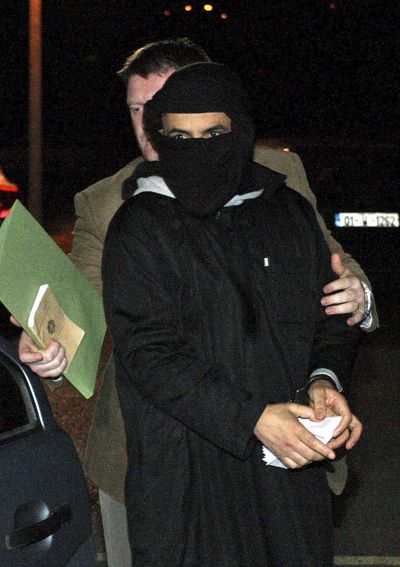Al-Qaida suspect linked to cartoonist plot extradited to US

PHILADELPHIA – An al-Qaida suspect linked to a plot to kill a Swedish cartoonist has been brought to Philadelphia from Spain to face terrorism charges in federal court, despite President Donald Trump’s promises to send terror suspects to the military prison at Guantanamo Bay.
Ali Charaf Damache, 52, of Algeria, appeared in court Friday and will be arraigned next month on charges that he conspired with two American women and a high school honors student from Maryland, court officials said.
A 2011 indictment accused him of aiding terrorism, including the plan to kill Swedish artist Lars Vilks, who depicted the prophet Muhammad as a dog. The plot never materialized.
The Trump administration’s decision to bring him to the United States marks a break from Attorney General Jeff Sessions’ oft-stated belief that Guantanamo Bay is the best place for “these kinds of dangerous criminals.”
During the presidential campaign, Trump said he not only wanted to keep the detention center in Cuba in Cuba open after the Obama administration had long fought to close it, but promised to “load it up with some bad dudes.”
Obama’s Justice Department maintained the U.S. civilian court system was the most legally sound forum in which to prosecute terror suspects captured in the U.S. and overseas and cited hundreds of convictions in New York and other cities as proof.
Yet Sessions and other Republicans have long expressed concern that civilian courts afford legal protections to which suspected terrorists are not entitled. He has warned valuable intelligence can be lost if a detainee is advised of his or her right to remain silent and to have a lawyer.
The Justice Department did not immediately say what led officials to send Damache to federal court or whether it signals a shift in Sessions’ views. The attorney general made no mention of the case during a Friday speech in Philadelphia on sanctuary cities and fighting violent crime.
Damache married a Colorado woman the day she traveled to Ireland to meet him in 2009. Jamie Paulin-Ramirez eventually helped the FBI investigate the terror cell, which included a Pennsylvania woman who called herself “Jihad Jane” online.
Damache, known as “Black Flag” had been fighting extradition after his 2015 arrest in Spain. Lawyer Joseph Mancano, appointed Friday to represent him, said he did not have any immediate comment.
Officials said that Damache joined co-defendants Mohammad Hassan Khalid, Colleen “Jihad Jane” LaRose and Paulin-Ramirez in forming a cell that recruited men online to wage jihad in South Asia and Europe, and to recruit women with western passports to travel through Europe in support of the cause.
LaRose is serving a 10-year prison term and Paulin-Ramirez eight years after pleading guilty to providing material aid to terrorism while Khalid, whose family had immigrated from Pakistan, was sentenced to five years.
Paulin-Ramirez took her 6-year-old son with her to Waterford, where he was taught to be a warrior and hate non-Muslims. The boy also endured physical abuse during the four-month stay, according to prosecutors who showed a video at her 2014 sentencing of him reciting inflammatory verses and thrusting a toy weapon as his mother laughed. She told the judge she hoped the boy would forget what she put him through.
A defense expert testified that she had a twisted view of the religion, culled from extremist postings.
Damache’s arraignment was scheduled for Aug. 28.
It’s unclear what the case could mean for future terror cases or for the future of Guantanamo Bay. Support for the military prison now would represent a complete reversal of eight years of efforts to close the detention center, which opened on the base in January 2002 to hold and interrogate suspected enemy combatants.
The Obama administration sent no new detainees there, and though it didn’t fulfill a promise to shut it down, whittled the population from 242 to 41. That includes seven currently facing charges by military commissions. All are in the pretrial stage, including the five men charged with planning and aiding in the Sept. 11, 2001, terrorist attack.